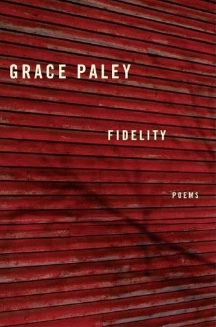Reading Grace Paley's final poetry collection, 'Fidelity', leaves one
feeling something akin to walking through a dicey neighborhood in the
midst of urban renewal – hope and despair, the romantic and the
run-down reside side by side. On page after page, they coexist in straightforward
musings as only Paley could deliver them.
Some poems have titles, but many go untitled. Like punctuation other
than line breaks and spacing, they are just extra clutter she has no
use for. Here is a poem from the first section of the book:
Anti-Love Poem
Sometimes you don't want to love the person you love
you turn your face away from that face
whose eyes lips might make you give up anger
forget insult steal sadness of not wanting
to love turn away then turn away at breakfast
in the evening don't lift your eyes from the paper
to see that face in all its seriousness a
sweetness of concentration he holds his book
in his hand the hard-knuckled winter wood-
scarred fingers turn away that's all you can
do old as you are to save yourself from love
Surely every poet writes about love and death, death and love. In these
poems, Paley doesn't just know her time is limited in the way we all
know, abstractly, the fact of our own mortality, but knows it in a real
way that carries imminent consequences: 'Fidelity' was published posthumously
in March of this year. Paley succumbed to breast cancer in August of
2007 at the age of 84. To steal a phrase from her poem “Sisters”
“the word dead is correct/but inappropriate.”
She writes often about friends and family who are failing or already
gone in verse that is tender, unsentimental and frequently run through
with an off-handed humor: “the reproductive/ and recreational
organs /of many of my older friends/ have been declared redundant dangerous/to
the hardworking body” (from “Many”).
In one untitled piece she interrupts herself midway to pen the lines,
“In any event I am/ already old and therefore a little ashamed/
to have written this poem full/ of complaints against mortality...”
Her observations of and encounters with strangers zoom in with the same
compassionate eye she affords those close to her. Poems like “Bravery
on Tenth Street,” with the focus of a frail older couple walking
along the street, “I Met a Woman on the Plane,” about her
conversation with a mother who lost a child, and the untitled poem that
begins “the very little girl looked at her grandfather”
are all testimonials to her careful involvement with the subject matter
about which she writes. From the final poem in the aforementioned list:
“...a man she'd seen/ last week was bobbing his head and waving
his/ arms and shouting go away and stop it and go/ to hell other words
very loud no one came/...bye-bye she said she/ waved the man exhausted
softly said bye-bye.”
It feels as if Paley is determined to get it right, and, clear in her
understanding that such a thing is impossible, she plugs her ears to
the sirens of fatalism and sidles up next to the reader, elbowing her
and pointing. “Get a load of this!” her poems seem to say,
marveling with infinite curiosity at this stubbornly broken world.
News
although we would prefer to talk
and talk it into psychological the-
or the prevalence of small genocides
or the recent disease floating
toward us from another continent we
must not while she speaks her eyes
frighten us she is only one person
she tells us her terrible news we
want to leave the room we may not
we must listen in this wrong world this
is what we must do we must bear it
A long-time political activist who worked for peace, Paley never stopped
supporting causes she believed in or speaking out whether asked to or
not.
In the poem “To the Vermont Arts Council on its Fortieth Birthday,”
she is invited to speak and opens by recalling when she turned forty
herself. She continues, talking about how soon after that birthday the
country dived into the Vietnam War and she muses on what artists of
all kinds made of that. Her poem ends this way: “...another/
American war with an unknown people/ thousands of miles away luckily/
Vermont the United States and the/ Arts Council is deep in poets most/
of us with big mouths (it is said) even/ the gentlest.”
Paley is her own best adjective – a name meaning at once compassionate,
vibrant, irreverent, melancholy, someone with unerring chutspah.
If you were looking for lyric poems that roll in luxurious language
and subtle metaphor, you chose the wrong book. Paley's poetry is closer
to colloquial, rough around the edges and uninterested in the degree
of craft that would buff the hard truth out of the meaning.
True, a handful of these poems don't quite come round to poetry and
clunk off the tracks. But mostly they are charming and unexpected beauties,
like the beloved across from you at the dinner table, too engrossed
in what he or she wants to say to wipe the ketchup from the sides of
their mouth.
Sadly, we can't all have an activist New York grandmother who writes
poetry; but fortunately, we can borrow the legacy of Grace Paley..
